

Lost documents. Incomplete and confusing information. Mysterious fees. Payments received but not applied. Homeowners waiting for a loan modification and suddenly placed in foreclosure. A nightmare of uncertainty, frustration and fear.
These incidents, described to me by numerous homeowners, mortgage counselors and defense lawyers, were supposed to be a thing of the past in California. After revelations of fraud and abuse throughout the mortgage business, including tens of billions of dollars in corporate penalties, state Attorney General Kamala Harris pushed through the 2012 California Homeowner Bill of Rights (HBOR), designed to standardize conduct by mortgage servicers – those companies that manage day-to-day operations on mortgages by collecting monthly payments and making decisions when homeowners go into default and seek help.
Yet one company allegedly committed all these HBOR violations: Ocwen, the nation’s fourth-largest mortgage servicer. According to the complaints, Ocwen (“New Co.” spelled backwards) either skirts around the edges of California law or simply ignores it,
» Read more about: Default Mode: How Ocwen Skirts California’s Mortgage Laws »

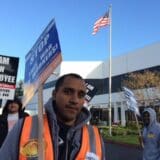
It’s 5:45 a.m. on Wednesday morning and it’s been a long night for Dennis Martinez and his fellow port truck drivers.
Martinez is nearing the end of a 48-hour strike against Total Transportation Services, Inc. (TTSI), the logistics company for which he has worked for two and a half years. The drivers are about to go through the toughest part of the two-day action – asking the company they have been striking against if they can return to work.
The fatigue shows on Martinez’s face. He hasn’t gotten much sleep but he expected that. He knew taking on a wealthy company wasn’t going to be easy.
A slender man dressed in a gray Aero sweatshirt, jeans and tennis shoes, Martinez is 29 but can pass for a teenager. He keeps headphones in his right ear just in case he needs a pick-me-up from Daddy Yankee and Pit Bull, two of reggaeton’s biggest artists.
» Read more about: Daring to Dream: Portrait of a Port Driver »


We’re excited to announce the creation of In The Public Interest’s ITPI Scholars Network as the next step in our growth and expanding influence on the issues of privatization and outsourcing of public services and assets across the country.
The ITPI Scholars Network brings together academics who are experts in diverse fields that relate to government privatization and outsourcing as well as responsible contracting.
Three members of the ITPI Scholars Network have recently released or are close to releasing studies that have found that careless outsourcing can harm communities, taxpayers and vulnerable residents:
• Dr. Daphne Greenwood of the University of Colorado released her new study The Decision to Contract Out: Understanding the Full Economic and Social Impacts. She found that reductions in contracted wages and benefits leads to a host of negative effects for the community at large; these harms include declining retail sales,
» Read more about: Scholars Network to Analyze Outsourcing and Privatization »
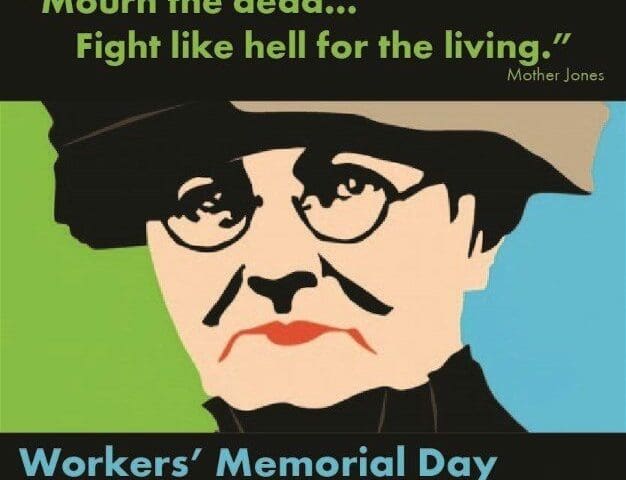
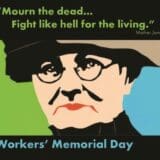
The virtual disappearance of work stoppages in America is hardly a sign of labor contentment but a reminder of how, in today’s hyper-stressed workplace, workers are afraid to protest when they believe their jobs hang in the balance. When a wildcat strike takes place, then, it’s safe to assume there must be powerful motivations behind it.
Baggage handlers working for Menzies Aviation at Los Angeles International Airport saw their 2012 walkout as a matter of life and death. At the time of their strike, three Menzies employees had been killed in California tarmac accidents, prompting workers to file complaints with Cal/OSHA about the workers’ lack of safety training and the company’s cavalier attitude towards faulty electrical equipment and the storage of fuel cylinders. The company took the bad PR and occasional fines in stride, however, and continued to conduct business as usual.
Then, this past February, a worker named Cesar Valenzuela was thrown from the luggage tug he had been driving and run over by the vehicle,
» Read more about: Mourning for the Dead, Fighting for the Living »
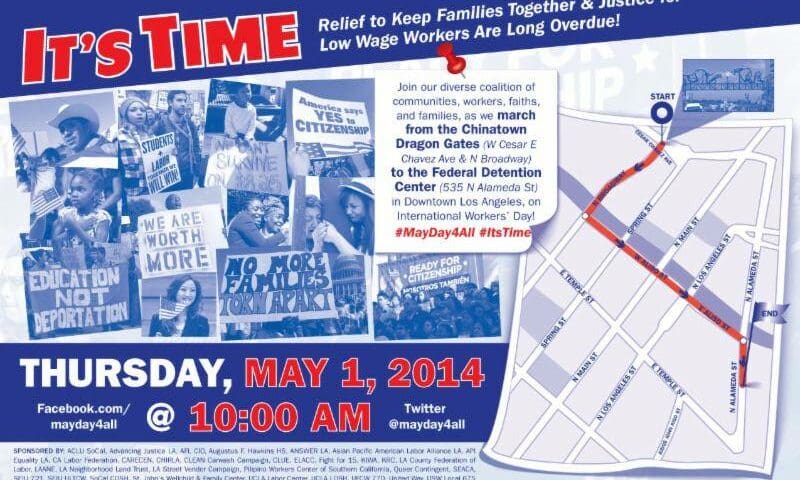
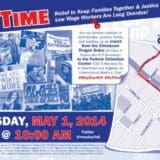
If you’ve had a hankering to visit downtown L.A. to sample artisanal sushi or to nail down a sale on that special luxury loft, Thursday, May 1, might not be the best day. If, however, you’re in the mood to demand that Congress pass immigration reform, or to call for the raising of the minimum wage or to honor the 5,000 American workers who died on the job last year, definitely drop by. The action begins 10 a.m. at Chinatown’s Dragon Gateway (Cesar Chavez Ave. and Broadway) and will move to the Federal Detention Center at 535 N. Alameda St., where marchers will demand the release of undocumented Americans.
Bring plenty of water, a hat or parasol, and any chant that begins, “Two, four, six, eight –” Brought to you by the Los Angeles County Federation of Labor.
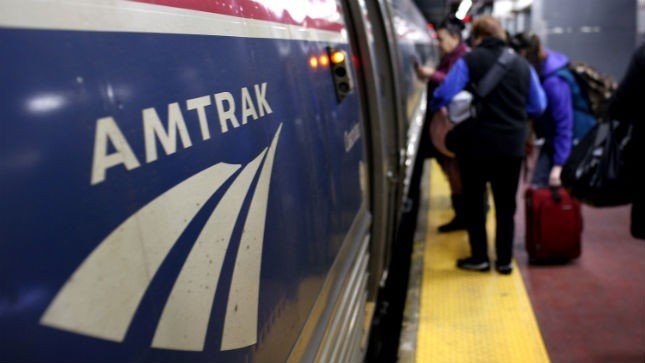
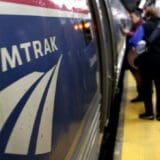
As a college sophomore in the late ’80s, I didn’t have the benefit of Wikipedia or the Google. Instead, the holy grail of research was a black and yellow study guide called CliffsNotes. These heaven-sent summaries of major literary works were a lot easier to read than the originals.
During one quarter, I took a philosophy class where I was assigned to write an essay on Plato’s The Republic. It was springtime in the Bay Area, so the last thing I wanted to do was write the essay. After a visit to the campus bookstore, I devised a strategy to quickly complete my assignment: Summarize the CliffsNotes, and then tack on some class lecture notes. I thought my plan was foolproof — until the professor returned my essay a couple of weeks later. In bright red, he marked comments up and down the margins and in between paragraphs,
» Read more about: Railcar Investment & Jobs: A Teachable Moment »
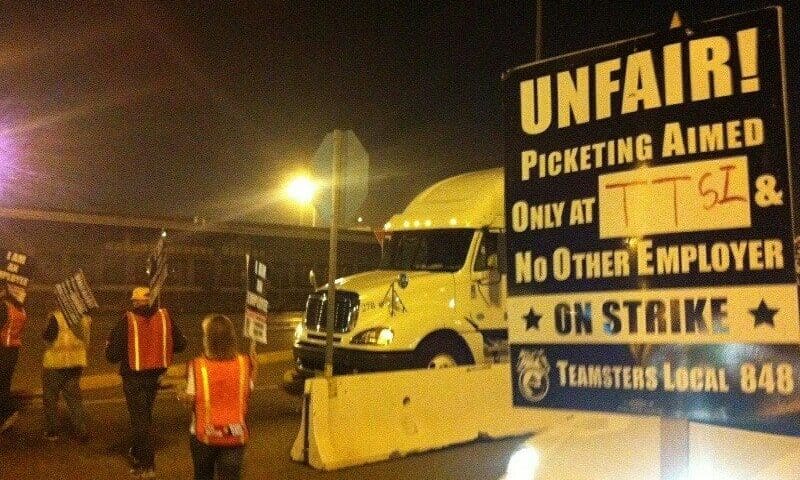
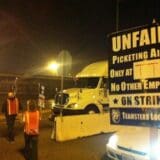
The 48-hour strike by harbor truck drivers ended at dawn today. The haulers have returned to work after drawing an unprecedented amount of public attention to their cause – and without facing dismissals or other forms of retaliation from the three companies they targeted. Those firms — Pacific 9 Transportation, Total Transportation Services, Inc. and Green Fleet Systems – stood accused by the drivers of misclassifying them as “independent contractors,” even as a growing body of labor court rulings shows that the truckers are company employees. As such, they should be entitled to overtime wages, workers compensation, disability and an array of other benefits.
By being placed in the limbo of contractor status, however, the drivers are responsible for all their trucks’ upkeep, fuel and insurance. As a result, like the vast majority of American truckers, port drivers in Los Angeles and Long Beach must subsist on poverty wages.
Some of the drivers joined the work stoppage,
» Read more about: Port Truckers End Strike, Return to Work Without Retaliation »
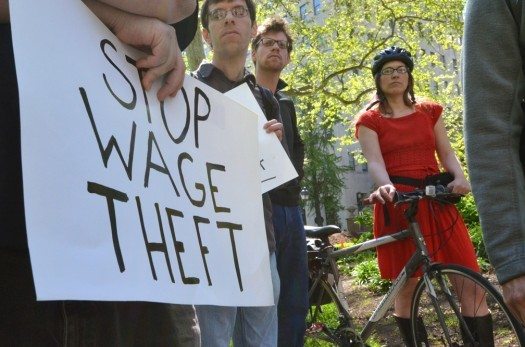
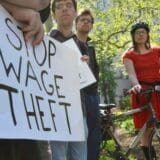
The gaudy evidence of income inequality is all around us: stratospheric CEO “wages,” private plane shuttles to Coachella, gated enclaves and all the rest. But few things say “class war” more eloquently than wage theft, the practice by unscrupulous businesses of short-changing their employees by undercounting work hours or shaving off time for breaks that were never taken.
Wage theft is probably about a minute older than ancient history’s first labor handshake and partly exists because most workers who suffer it are too financially insecure to complain. Now, however, there is increasing pushback from some city and state governments, and from workers themselves –McDonald’s low-wage employees have filed class action lawsuits in several states to recover wages they allege were gouged from their paychecks.
In California, Assembly Bill 2416 (“California Wage Theft Prevention Act”), introduced by Mark Stone (D-Monterey Bay), seeks to curb wage theft by allowing workers to file liens against the real and business property of employers they claim owe them wages.
» Read more about: Lien In: New California Bill Seeks to Curb Wage Theft »
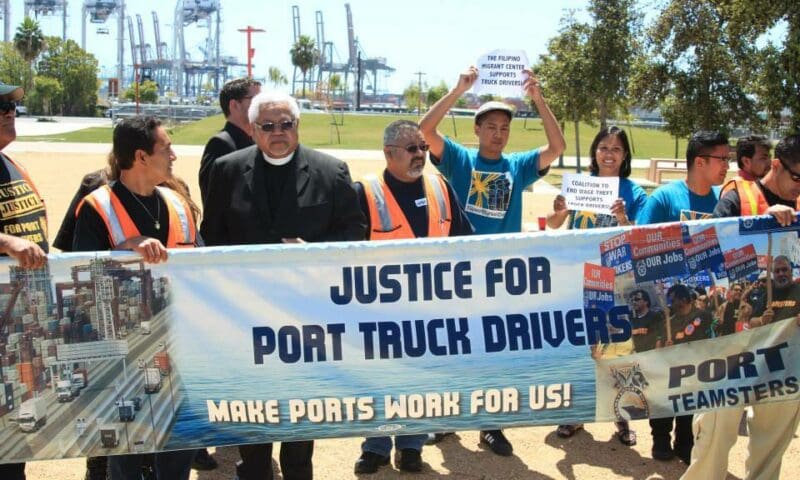
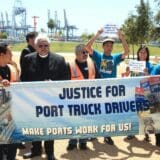
Port truck drivers today continued a 48-hour strike to press their demand to be treated as employees of trucking companies rather than as independent contractors. The distinction is crucial to thousands of drivers who service the nation’s largest port complex, including the more than 100 strikers who drive short hauls for Pacific 9 Transportation, Total Transportation Services, Inc. and Green Fleet Systems. Currently misclassified by the companies as private contractors, these drivers, like the majority of U.S. port truck drivers, are denied overtime wages, workers compensation, disability and a host of other benefits, and must pay for the fuel and maintenance of their vehicles. Furthermore, after paycheck deductions many drivers earn poverty wages despite working long hours during six-day weeks.
At a noontime media event held in Wilmington Waterfront Park, TTSI driver Dennis Martinez told a crowd that “We had to strike because they didn’t want to listen. They didn’t want to deal with us.”

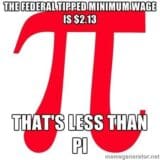
Are zero-dollar pay stubs and sub-minimum wages really what keep the restaurant industry afloat? That’s what one powerful lobbying group would have us believe.
Taylor Lee can tell you the real impact of minimum wages for tipped workers. Taylor is a 23-year-old restaurant server working in Berkeley, California. Like two-thirds of tipped workers, she is a woman. In California, the minimum wage is currently $8 per hour, whether you get tips or not. This is the amount that Taylor’s employer pays her, “but with tips, if it’s really slow, I make $12 per hour,” she says. “My average wage is about $18-20 per hour.”
From 2006 to 2013, Taylor worked as a server at restaurants in Florida. The minimum wage in Florida is $7.93, but the minimum wage for tipped workers is $4.91. She worked at a Japanese restaurant as a server. If she didn’t get enough tips to make it to $7.93 per hour,

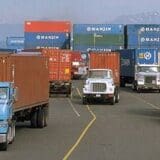
The years-long fight of Los Angeles Port truck drivers to be recognized as company employees– instead of “independent contractors” who lack workplace rights and protections – burst into a 48-hour strike this morning. The work stoppage by drivers for four major trucking firms is organized by Justice for Port Drivers and is targeting the marine container terminals at the twin ports of Los Angeles and Long Beach.
Despite winning a string of labor court rulings in wage theft lawsuits, the drivers say they are still misclassified as independent contractors. That misclassification has meant that drivers are denied overtime wages, workers compensation, disability and a host of other benefits, and must pay for the fuel and maintenance of their vehicles. It has also guaranteed that after paycheck deductions, many drivers who work long hours during six-day weeks earn poverty wages.
This is the second strike in six months by drivers,
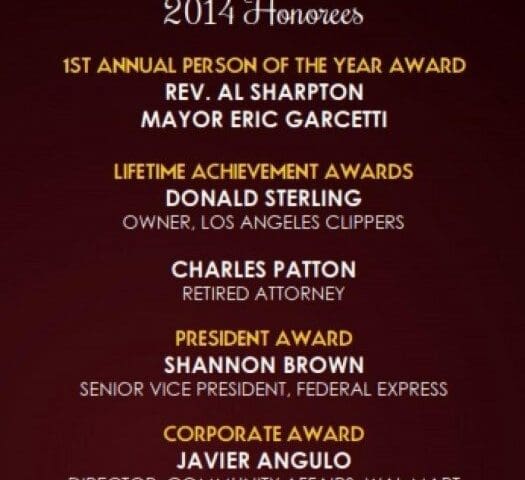

In an excruciating example of bad timing, the Los Angeles chapter of the NAACP was scheduled to bestow its Lifetime Achievement Award to Donald Sterling, owner of the Los Angeles Clippers basketball team, at its May 15 banquet. Sterling is now under fire for racist comments caught on a recording that surfaced on the TMZ website. Even President Barack Obama weighed in, condemning Sterling’s remarks as “incredibly offensive.” The NBA is now investigating Sterling’s remarks and could invoke sanctions, including removing him as Clippers’ owner.
Embarrassed by the controversy, the NAACP announced Sunday morning, via Twitter, that is was withdrawing the award, which was to be presented at the Millennium Biltmore Hotel in Los Angeles as part of the celebration of the chapter’s 100th anniversary. The NAACP also plans to honor Rev. Al Sharpton and Los Angeles Mayor Eric Garcetti — as well as Walmart’s local charity and political operative and a top Fed Ex executive —


It’s been a long, dark road for America’s port truck drivers, but finally there’s a light at the end of the tunnel. After nearly 30 years of ruthless exploitation by the trucking industry, the drivers who transport the goods that fuel our consumer economy may be poised to rejoin the country’s middle class, thanks to an important determination by a regional office of the National Labor Relations Board.
Last month, the NLRB’s Los Angeles office announced the settlement of a casebrought by truck drivers against Pacific 9 Transportation Inc. The drivers alleged that the company had illegally used threats and intimidation to prevent them from exercising their right to form a union, a practice that is rampant across the country thanks to our lax labor laws.
But here’s where it gets interesting. Pac 9’s drivers are considered independent contractors by the company and, according to labor law, independent contractors —
» Read more about: America’s Sweatshops on Wheels Find a Light at the End of the Tunnel »


After years of neglect, the minimum wage has suddenly become a major national issue. President Obama has proposed an increase in the federal minimum to $10.10 an hour, fast food workers are agitating for $15, and candidates who back a higher wage floor, including an avowed socialistin Seattle, are winning local elections. In February, the retailer Gap Inc. announced that it was implementing a nationwide minimum wage for 65,000 of its own 90,000 employees (although only $9 an hour).
The minimum wage is an important issue in other countries as well, although we rarely hear about these cases.
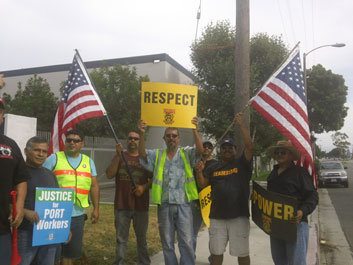
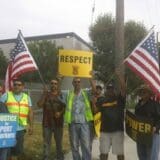
Almost 50 years ago, Bob Dylan recorded with an electric guitar and band for the first time and produced Subterranean Homesick Blues, a culture-altering event that claimed, among other things, that, “you don’t need a weatherman to know which way the wind blows.” That song signaled a cultural change that resonated with forward-looking people of the time, but the truth was ignored or dismissed by those who preferred to look back. Similarly, this is a moment when the wind is blowing strongly in the direction of justice, and those who ignore it risk being left behind.
In previous articles, we have highlighted the prevalent fiction of “independent contracting,” a deception that affects the 12,000 port truck drivers who dray goods out of the Ports of Los Angeles and Long Beach, among the 75,000 drivers nationwide. Drivers in the current system must pay a lease on a truck,
» Read more about: Port Drivers’ Misclassification Homesick Blues »


There has been no shortage of ink spilled on the so-called “sharing economy”. To cut through the rhetoric, LAANE’s Jon Zerolnick spoke with Tom Slee, an Ontario-based writer whose work on the intersection of technology, politics, and economics has appeared in The Literary Review of Canada, The New Inquiry, The Guardian, and Jacobin.
 Let’s start with some definitions. What is the sharing economy?
Let’s start with some definitions. What is the sharing economy?
The sharing economy is internet platforms, and more-or-less independent people exchanging real-world goods and services through those platforms. This doesn’t necessarily have anything to do with sharing, but that is the name now.
Some of these platforms started off non-commercial. I’m thinking of things like Couch Surfing, where individuals host each other in their own homes, with no money exchanged; it was a non-profit and provided a coordination service.
» Read more about: Couch Surfers and Billionaires: On the Sharing Economy »
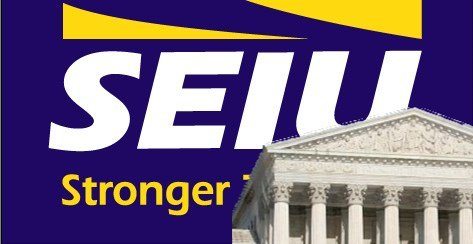

Springtime is typically emblematic of the birth and growth of new life forms. However, in 2014 this time of year could become a moment of death for the labor movement as we have come to know it. In the coming weeks the United States Supreme Court will render a decision in the case of Harris v. Quinn that could paralyze labor’s ability to organize workers throughout the country. Despite its major implications, the case remains largely absent from our mainstream discourse or even within discussions among progressive allies.
Harris v. Quinn comes out of years of successful organizing by the Service Employees International Union to win collective bargaining rights for thousands of home health and child care workers in Illinois. In 2009, Democratic Governor Pat Quinn signed an executive order to grant home care workers the right to unionize.
The main plaintiff in the case,


A quarter of all working Americans have no savings, and half die with less than $10,000 in financial assets. Nevertheless, some of us will have a small nest egg, and where to put that bit of money can be a challenge. Even for many socially minded people what we know we’ve learned from “talking to Chuck.” But there are alternatives and they matter.
I first became aware of other ways to think about investments when I realized my denomination’s retirement fund screens its portfolio for tobacco, alcohol, gambling and guns. Many other faith communities with substantial funds do also. There are also a number of public mutual funds that have significant track records in screening for social responsibility issues. Some invest in alternative energy. Some avoid military contractors. Some look for environmentally enhancing product lines. Others invest in locally owned small businesses or in organic food sources. And some do a combination of all those.
» Read more about: Finance the Future By Investing in Change »
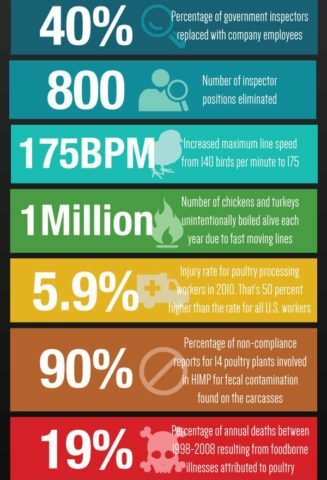
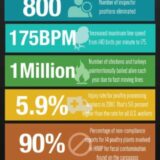
In most of the country the weather is finally getting warmer and the imagery of baby chickens and pastel eggs surround us – but yellow fuzzy chicks aren’t just a symbol for spring and Easter. They’re also part of the $38 billion poultry industry and a controversial proposal by the USDA to privatize poultry inspection.
In 2012, the USDA announced a proposal to expand a pilot program known as “HACCP-based Inspection Models Project” (or HIMP for short) that allows the poultry industry to reject government inspectors and allow company employees to police themselves. That’s right: The fox is literally guarding the hen house.
Obviously this is a big deal, so we created an infographic you can share about the 7 things you should know about the USDA’s plan to privatize poultry inspection. When you click on the image you will learn more about what you can do to speak out about this urgent issue.
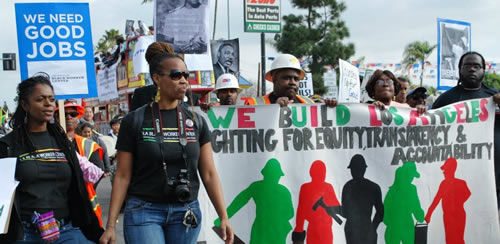
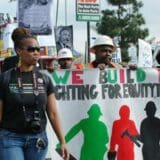
A recent report from the Los Angeles Black Worker Center addresses challenges facing African American workers, while offering strategies for combating unemployment and low wages. Black Worker Congress Blueprint for Addressing the Jobs Crisis focuses on information gathered from the Black Workers Rising for Justice, Jobs and Dignity congress, a gathering of workers and leaders of community and labor groups, held last September. The event, which occurred alongside the AFL-CIO national convention, gave African Americans a platform to voice concerns about labor and economic issues. Some of the report’s key findings:
The report cites some alarming statistics about the unemployment rates among blacks and whites from Steven Pitts, an economist from the University of California Berkeley Labor Center. Pitts claims that the unemployment rate for whites during the height of the recession remained below the nine percent jobless rate that African Americans faced before the recession even began.